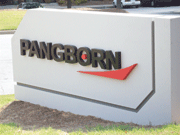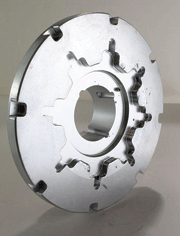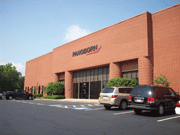E-Archive
Interview
in Vol. 9 - July Issue - Year 2008
Blasting Equipment, Service, and Improved Technology to a Worldwide Surface Preparation Marketplace

Ken Dickson, President and CEO of Pangborn Corporation


Outer Runnerhead of Rotoblast wheel

MFN spoke with Ken Dickson, President and CEO of Pangborn Corporation, about the company’s position in the global marketplace and other topics. Pangborn Corporation designs, markets and services shot blast machines, dust collectors and related products for the primary metal and metalworking industries. Since 1904, Pangborn has led the way in the surface preparation industry, from the design of equipment to the services and products required to install, maintain and operate blast machines.
(?) MFN: What is Pangborn’s primary business?
(!) K. D.: Pangborn designs and markets blast cleaning and peening equipment, integrated surface preparation systems, associated replacement parts, and service programs. We distribute throughout the world to industries that prepare the surfaces of metal and other products.
(?) MFN: What new equipment do you offer?
(!) K. D.: Pangborn’s primary focus is in motorized wheel blast equipment. Pangborn can supply machines that do batch work such as barrels, tables, and hook type machines. We also make pass through machines utilizing varying conveying devices like wire mesh belts, rollers, monorails and work cars to maximize production efficiencies. Pangborn also supplies a line of dust collectors that complement the operation of blast machines.
(?) MFN: Do you offer replacement parts?
(!) K. D.: Yes. Due to exposure to harsh abrasives, blasting equipment undergoes extreme wear in normal use. Replacement parts are supplied to exacting OEM specifications and help customers achieve performance on older machines similar to brand new equipment.
(?) MFN: Can customers save money by rebuilding existing equipment rather than buying new?
(!) K. D.: Yes. A quality rebuild on Pangborn machines offers a cost-effective alternative to purchasing new machinery, allowing you to maximize the life of your current installation while maintaining optimum productivity. Pangborn can even retrofit other manufacturer’s machines to allow customers to achieve the same productivity and cost savings available with a Pangborn machine.
(?) MFN: What are your primary markets?
(!) K. D.: The primary markets for Pangborn’s products are foundries, primary metals manufacturers, the automotive industry, aerospace, construction, infrastructure, the military, the energy industry and general metal working.
(?) MFN: Please describe the blasting process you use for those not familiar with it.
(!) K. D.: Blast equipment uses a motorized wheel to propel steel shot or grit for deburring, descaling, peening or removing sand to prepare metal products for further processing. Because of the greater velocity achieved in hurling abrasives, wheel blast equipment yields higher levels of productivity.
(?) MFN: Can you describe the peening process?
(!) K. D.: In the peening process, a stream of metal particles is applied at high velocity via a Rotoblast wheel against the surface of a metal part. The contact alters the surface, creating a rounded depression. The magnitude of the depression defines how the part will function in relation to tensile strength, stress management, elimination of surface cracks, fatigue reductions and surface integrity.
(?) MFN: What is the role of blasting in the foundry setting?
(!) K. D.: In the foundry, sand, rust, paint and powder, epoxy or other coatings may be removed from metals through the process of blast cleaning. Normally, the metal is being prepared for another coating process, so it is important to remove all matter that would cause a poor finish.
(?) MFN: And the role in metal manufacturing?
(!) K. D.: Mill scale produced in the manufacturing of metals is removed by blast machines. Plate, sheet, strip, wire, bars, billets and other products can be descaled. Blasting improves welding and machining operations, lengthens the life of tool and dies, eliminates environmental issues raised by the use of chemical descaling systems and creates a proper surface for today's coatings.
(?) MFN: How is blasting used in the automotive industry?
(!) K. D.: Blasting of engine blocks and transmission housings, as well as peening of gears and springs, are a few of the automotive applications where blast machines play an important part in producing parts.
With heavy trucks, because of the long hours of operation and high mileage usage, manufacturers have exacting standards for the components they use. Blast machines are used by manufactures of engines, frames, fifth wheels and trailers.
Off-road vehicles, used in construction, agricultural, mining, are another important segment. All vehicles have engines and transmissions which require multiple blast operations on components. Also, booms on cranes, shovels, graders, pickers, plows and other accessories on the vehicle will be blasted prior to assembly.
(?) MFN: How is your equipment used in the aerospace industry?
(!) K. D.: Shot peening, shot blasting, and other surface preparation processes are used on aircraft wings, engines and other parts. Aircraft manufacturers and their suppliers require precise material specifications due to demanding stress and other conditions that aircrafts encounter. Aircraft components, gears, springs and other critical parts undergo peening operations.
(?) MFN: What about the military? What role does Pangborn serve in that market?
(!) K. D.: Repair services are a vital part of national defense. Ships, tanks, carriers, aircraft, and weaponry are all repaired and rebuilt by special facilities. These operations use blast machines to clean metal parts that will be resent to the armed forces. Pangborn Corporation throughout its history has been a preferred supplier to the armed forces of the United States of America. Pangborn blast machines can be found in the Naval yards, Army depot facilities, arms manufacturing and Air Force bases.
(?) MFN: Outside of the United States, in which regions and countries is Pangborn growing?
(!) K. D.: We sell a lot of equipment in China, India and Poland. Most of the growth is occurring in Asia and Eastern Europe.
(?) MFN: Is there a growing need for your equipment for infrastructure worldwide?
(!) K. D.: Yes, economic growth throughout the world drives the need for infrastructure additions and improvements in the form of buildings, bridges, pipelines, street lights, and other products. Pangborn machines are used on steel plates, beams and other structural shapes, fire hydrants and special design concrete poles.
(?) MFN: In addition to equipment, what services do you offer to Pangborn customers?
(!) K. D.: Pangborn offers preventive maintenance, installation and inspection services of blast equipment. We provide engineering, service and preventive maintenance. Our service engineers coupled with authorized mechanical contractors provide the many services users of blast machines require.
(?) MFN: What if a customer is not sure what type of setup will work best for them?
(!) K. D.: The process begins with a detailed review with an industry expert who will assist you in selecting the right machine configuration, dust collector, and work handling systems.
Pangborn can act as an integrator and plan your manufacturing processes before and after the blast machine.
(?) MFN: Do you offer installation service?
(!) K. D.: Yes. Our approved installers, coupled with supervision from our service technicians, can erect your machine in a timely and accurate manner or provide supervision and technical guidance to your installers.
(?) MFN: What kind of maintenance can you provide?
(!) K. D.: Pangborn can customize a preventive maintenance program for your machine or machines. Pangborn engineers will use factors such as hours of production per week, the type of abrasive used, the product mix run through the machine and the customer's production requirements to determine the optimal period length between maintenance cycles.
(?) MFN: Can you inspect existing equipment?
(!) K. D.: Yes. Under Pangborn’s inspection service program, a Pangborn service technician will visit your facility and perform an inspection on all aspects and parts of your blast machine. You will receive a written inspection report on the status of your Rotoblast wheels, abrasive handling system, material handling system, dust collection system, cabinet, and all other major components of the blast cleaning process. This report will detail, down to part level, which components need replacement.
(?) MFN: With the ever present issue of employee turnover in the manufacturing industry, how can Pangorn help customers in that regard?
(!) K. D.: Pangborn will supply on site training of new employees that completely covers the safety aspects and efficient operation of blast machines. A Pangborn representative will visit your facility and teach a class on how to operate and maintain your blast machine. A special emphasis is put on safety.
(?) MFN: Pangborn is a well known name in the industry. Can you briefly tell our readers about the origins and history of the Pangborn company name?
(!) K. D.: The Pangborn Corporation was founded in 1904 when Thomas W. Pangborn pioneered the use of sandblasting in foundry work, combining compressed air and sand to clean metal by particle impact.
(?) MFN: You’ve recently relocated your headquarters near Atlanta in the Eastern U.S. Does your company’s location bring any benefits to your business?
(!) K. D.: Yes. We are close to the third best engineering school in the country, Georgia Tech, and to one of the world’s largest airports, Atlanta’s Hartsfield-Jackson Airport.
(?) MFN: Where are you headed next in research and development?
(!) K. D.: Pangborn is investigating ways to transfer technology developed on our latest wheels to all existing wheels. We hope to save customers money by retrofitting rather than replacing wheels.
(?) MFN: Can you give examples of how you have responded to the marketplace?
(!) K. D.: Yes. Last year we improved the design of skew roll blast machines for cleaning of sucker rods, pipes, bars, gas cylinders and other round and tubular products. The updated designs feature optional narrow vane technology for small diameter products.
Pangborn also has developed a state-of-the-art Gripper machine in response to the demand for greater throughput and improved productivity. This machine has proven more dependable and cost effective than robotic alternatives. Used by automotive foundries to clean new castings, the Gripper is the best method to convey parts quickly and obtain the level of surface preparation required in the next step of the process.
(?) MFN: In talking to customers, what challenges do you see facing the industry in the near future?
(!) K. D.: We are asked to contain costs and conserve energy. There is a need to help customers reduce processing, energy and operating costs.
(?) MFN: Where do you see the growth potential for shot blasting?
(!) K. D.: There are opportunities for blasting to be used in some applications to replace chemical processes that are not environmentally friendly.
MFN would like to thank Ken Dickson for this interview.
For Information:
Pangborn Corporation
4630 Coates Drive Fairburn, GA 30213 USA
Toll Free: +1.800.638.3000
Tel. +1.404.665.5700, Fax +1.404.665.5701
www.pangborn.com



























